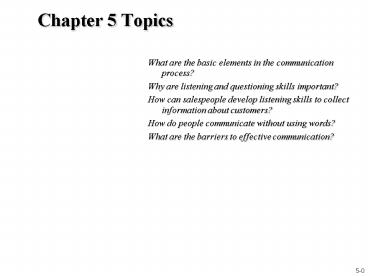Chapter 5 Topics PowerPoint PPT Presentation
1 / 20
Title: Chapter 5 Topics
1
Chapter 5 Topics
- What are the basic elements in the communication
process? - Why are listening and questioning skills
important? - How can salespeople develop listening skills to
collect information about customers? - How do people communicate without using words?
- What are the barriers to effective communication?
5-0
2
Modes of Communication
5-1
3
Making Verbal Communication Effective Effective
Use of Words
Use concrete rather than abstract words.
- Rephrase this to make it more concrete
- We offer a great warranty.
- Which is more effective?
- We ship orders quickly.
- We ship orders within 24 hours after receiving
them.
5-2
4
Making Verbal Communication Effective Effective
Use of Words
Dont use words that trigger fear
Exhibit 5.3
5-3
5
Making Verbal Communication Effective Effective
Use of Words
Tailor your words to the customers preferred
communication style.
- Some people see things, others hear or feel them.
5-4
6
Making Verbal Communication Effective Modify
Your Voice
Can you demonstrate the differences in these
voice characteristics?
- Speech rate
- Loudness
- Inflection
- Articulation
5-5
7
Guidelines for Asking Questions
Use open-ended questions
- Open questions encourage customers to speak
freely.
5-6
8
Guidelines for Asking Questions
Use closed-ended questions judiciously.
- Closed-ended questions can be answered with a
word or short phrase.
5-7
9
Guidelines for Asking Questions
Space out questions.
- When salespeople ask several questions, one right
after another, customers may feel threatened.
5-8
10
Guidelines for Asking Questions
Avoid leading questions
- Questions should not suggest an appropriate
answer.
5-9
11
Guidelines for Asking QuestionsAsk questions to
collect information.
Ask questions to collect information
- These questions usually start with who, what,
where, when, why or how. - Questions can be used to
5-10
12
Guidelines for Asking QuestionsAsk questions to
maintain information flow.
Ask questions to maintain information flow
- Use brief verbal responses, such as Really?,
Uh-huh, or Thats interesting. - Use requests for additional information, such as
Can you give me an example of what you mean?
5-11
13
Suggestions for Active Listening
- Repeat information
- Restate or rephrase information
- Clarify information
- Summarize the conversation
- Tolerate silences
- Concentrate on what is being communicated
5-12
14
Reading the Customers Non-Verbal Communication
- Body angle
- Face
- Arms
- Hands
- Legs
- Body language patterns
- Detecting hidden emotions
5-13
15
Patterns of Nonverbal Reactions to Presentation
Exhibit 5.5
5-14
16
Sending Non-Verbal Communication
- Eye contact
- Hand movements
- Posture and body movements
- Matching customers communication style
5-15
17
Distance Zones for Interaction
- Intimate zone
- 0-2 feet
- Personal zone
- 2-4 feet
- Social zone
- 4-12 feet
- Public zone
- More than 12 feet
Exhibit 5.6
5-16
18
Dress for Success Men
- In general, darker suits give a more
authoritative image lighter colors create a
friendlier one. - Pinstripes convey the most authority, followed by
solids. - Solid white shirts or shirts in pastel colors.
- Let the tie provide the accent color.
5-17
19
Dress for Success Women
- Navy, black, and gray suits worn with
light-colored blouses are part of any wardrobe. - Add suits in more cheerful shades, wool or silk
dresses with jackets, and blazers with
coordinated skirts. - Silk scarves can add flair and a touch of color.
- Hairstyle should be subtle and comfortable.
5-18
20
Adjusting for Cultural Differences
- Use of Language
- Use common English words
- Use words with fewest alternative meanings
- Avoid slang
- Use proper rules of grammar
- Use action-specific rather than action-general
verbs - Time and Scheduling
- Perception of time varies
- Time for business activities varies
5-19

